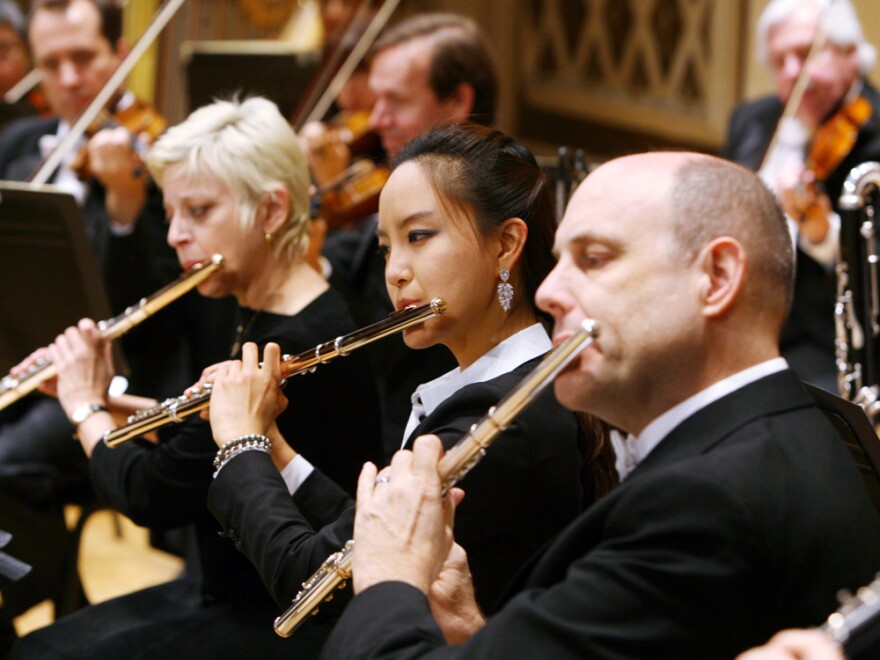It's old news that technological advances have rattled the grand old record labels. The golden era of companies like EMI, Deutsche Grammophon, RCA and Columbia has come and (mostly) gone. It's been sobering for orchestras that once luxuriated in fancy recording contracts. But there's a silver lining, as the same advances in recording and distribution have enabled orchestras, chamber groups and even soloists to create in-house labels, gaining freedom rarely available when titanic companies set the rules. Below are five releases from American orchestras on their very own labels. Each one makes a distinctive statement, not by pandering to popular tastes, but by playing to each ensemble's strengths.
(Have your own favorite self-produced classical records of 2011? Let us know in the comments section.)
Charting Their Own Paths: Top 5 Orchestral Albums Produced In-house
Chicago Symphony Orchestra Brass

"Sacrae Symphoniae: No. 10: Canzon duodecimi toni for 10 parts"
From 'Chicago Symphony Orchestra Brass: Live'
By Chicago Symphony Orchestra Brass
Like many orchestras who made their reputations in the golden age of big-label recording, the Chicago Symphony Orchestra has recently seen a gradual transition to a new generation of players. After a period of settling in, the CSO brass announce (as only brass can) that one of the strongest aspects of the orchestra's identity is in good hands. No British reserve in Walton's Crown Imperial here, just brawny Midwestern punch. Gabrieli comes at you in full modern-instrument brightness, and, in the highlight of the disc, Grainger's Lincolnshire Posy, with some gorgeous soft playing, could make you wonder if woodwinds are necessary at all.
Atlanta Symphony Orchestra (Robert Spano, cond.)

"Theofanidis: Symphony No. 1 (excerpt)"
From 'Theofanidis Symphony No. 1'
By Atlanta Symphony Orchestra
Since the arrival ten years ago of Robert Spano as music director, the Atlanta Symphony Orchestra has continuously brought new music to its audience, sharing the mantle previously held by groups like the Louisville Orchestra and maintaining a tradition established by one of his predecessors, Robert Shaw. The brightly kinetic First Symphony by Christopher Theofanidis is a blazing demonstration of the appeal of the orchestra's signature "Atlanta School" of composers. By including Peter Lieberson's Neruda Songs in a gorgeous performance by mezzo-soprano Kelley O'Connor, the ASO embraces a piece that was perhaps in danger of being confined to a too-sacred, untouchable space, confirming it now as a truly enduring classic of our time.
Boston Symphony Chamber Players

"Francaix: Dixtour (Allegro moderato)"
From 'Profanes et Sacrees'
By Boston Symphony Chamber Players
The drama of James Levine's departure from Boston and its attendant publicity have tended to obscure the fact that the BSO remains an ensemble with a distinct identity, built on several strands of rich history. The Chamber Players pick up two strands of that heritage in this recording. The BSO's French legacy comes through in these musicians' ability to create both soft-focus and crystal-clear sounds simultaneously. And the orchestra's historic commitment to drawing connections between contemporary music and established repertoire illuminates the music on this disc, which ranges from 1907 to 1991.
San Francisco Symphony (Michael Tilson Thomas, cond.)

"Copland: Organ Symphony (Finale, excerpt)"
From 'A Concord Symphony'
By Michael Tilson Thomas San Francisco Symphony
Now that Michael Tilson Thomas' landmark Mahler project has concluded (17 CDs in all), SFS Media comes through with a very different recording, but one that says just as much about MTT and San Francisco. Here's a conductor with some of the best recordings of Charles Ives' music on his resume, so who better to get the most out what could have been the mere curiosity of Henry Brant's orchestration of Ives' "Concord" Piano Sonata? Copland also figures strongly into MTT's musical identity (he studied with the composer), and to hear the Organ Symphony is to encounter that fearlessly robust, all too rarely heard voice of the pre-Appalachian Spring American icon.
The album is available at the San Francisco Symphony and at iTunes.
Cincinnati Symphony Orchestra (Paavo Jarvi, cond.)

"Fireflower, for orchestra"
From 'Baltic Portraits'
By Paavo Järvi
In the 11 years Paavo Järvi led the Cincinnati Symphony Orchestra, a series of fine if largely undistinguished recordings of standard orchestral repertoire emerged on the Telarc label. This disc represents a dramatic contrast. Järvi leaves Cincinnati after this season, departing with a dynamic, brilliantly played homage to his musical roots in Estonia and Finland. These performances from the last decade show that while this fascinating music was happening during Järvi's entire tenure, only the most conventional repertoire was being disseminated via recordings. No better case for orchestras to cast off the shackles of labels and chart their own paths.
Brian McCreath is a radio host and producer for Classical New England, a service of WGBH Boston.
Copyright 2011 GBH



